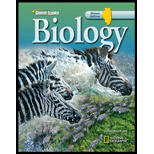
Concept explainers
Introduction:
The evolutionary tree is arranged like a family tree, and the branches reflect the phylogeny of species. The trunk shows the earliest animals and the branches reflect the evolution of the main phyla of animals from a common ancestor. The branching points on the evolutionary tree mark anatomical features in the animal's body plans.
Answer to Problem 14A
Correct answer :
The correct answer is option (D) Most animals have bilateral symmetry
Explanation of Solution
Explanation/justification for the correct answer :
Option (D) Most animals have bilateral symmetry. In the evolutionary tree, most of the animals are bilateral symmetry and these animals are
Explanation for incorrect answer :
Option (A) True tissues evolved after bilateral symmetry. In the evolutionary tree, true tissues do not evolved after bilateral symmetry. It evolved before bilateral symmetry. So, this is an incorrect option.
Option (B) Segments evolved after bilateral symmetry. In the evolutionary tree, segments evolve only in chordates after formation of bilateral symmetry. So, this is an incorrect answer.
Option (C) The common animal ancestor was a sponge. Sponges are the only animals that do not have tissues. So, this is an incorrect answer.
Based on the evolutionary tree, most of the animals are bilateral symmetry. Hence, the correct answer is Option (D) Most animals have bilateral symmetry
Chapter 24 Solutions
Biology Illinois Edition (Glencoe Science)
Additional Science Textbook Solutions
Microbiology with Diseases by Body System (4th Edition)
Biology: Life on Earth
Genetic Analysis: An Integrated Approach (2nd Edition)
Campbell Biology (11th Edition)
Campbell Essential Biology with Physiology (6th Edition)
Campbell Biology in Focus (2nd Edition)
 Human Anatomy & Physiology (11th Edition)BiologyISBN:9780134580999Author:Elaine N. Marieb, Katja N. HoehnPublisher:PEARSON
Human Anatomy & Physiology (11th Edition)BiologyISBN:9780134580999Author:Elaine N. Marieb, Katja N. HoehnPublisher:PEARSON Biology 2eBiologyISBN:9781947172517Author:Matthew Douglas, Jung Choi, Mary Ann ClarkPublisher:OpenStax
Biology 2eBiologyISBN:9781947172517Author:Matthew Douglas, Jung Choi, Mary Ann ClarkPublisher:OpenStax Anatomy & PhysiologyBiologyISBN:9781259398629Author:McKinley, Michael P., O'loughlin, Valerie Dean, Bidle, Theresa StouterPublisher:Mcgraw Hill Education,
Anatomy & PhysiologyBiologyISBN:9781259398629Author:McKinley, Michael P., O'loughlin, Valerie Dean, Bidle, Theresa StouterPublisher:Mcgraw Hill Education, Molecular Biology of the Cell (Sixth Edition)BiologyISBN:9780815344322Author:Bruce Alberts, Alexander D. Johnson, Julian Lewis, David Morgan, Martin Raff, Keith Roberts, Peter WalterPublisher:W. W. Norton & Company
Molecular Biology of the Cell (Sixth Edition)BiologyISBN:9780815344322Author:Bruce Alberts, Alexander D. Johnson, Julian Lewis, David Morgan, Martin Raff, Keith Roberts, Peter WalterPublisher:W. W. Norton & Company Laboratory Manual For Human Anatomy & PhysiologyBiologyISBN:9781260159363Author:Martin, Terry R., Prentice-craver, CynthiaPublisher:McGraw-Hill Publishing Co.
Laboratory Manual For Human Anatomy & PhysiologyBiologyISBN:9781260159363Author:Martin, Terry R., Prentice-craver, CynthiaPublisher:McGraw-Hill Publishing Co. Inquiry Into Life (16th Edition)BiologyISBN:9781260231700Author:Sylvia S. Mader, Michael WindelspechtPublisher:McGraw Hill Education
Inquiry Into Life (16th Edition)BiologyISBN:9781260231700Author:Sylvia S. Mader, Michael WindelspechtPublisher:McGraw Hill Education





